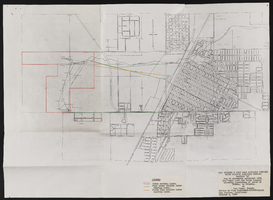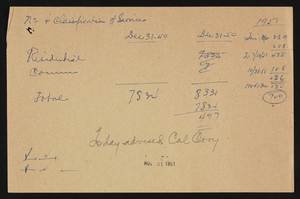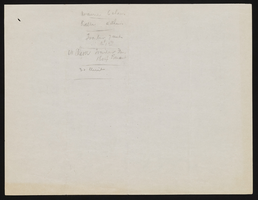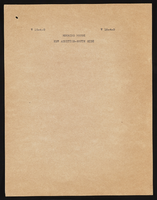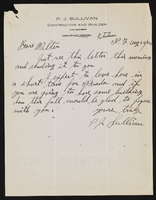Search the Special Collections and Archives Portal
Search Results
Peggy Hyde Phillips Papers
Identifier
Abstract
The Peggy Hyde Phillips Papers (1929-1998) document the lives of Peggy Hyde Phillips, her first husband Charles, and her son Michael. Materials include family photographs, correspondence, newspaper clippings, and documents from Michael Hyde’s time as a student at the United States Air Force Academy. The collection also includes a near-complete run of issues from February 1, 1963 through May 8, 1964 of the
Archival Collection
Cliff Segerblom Artwork
Identifier
Abstract
The Cliff Segerblom Artwork contains four pieces of Segerblom's artwork. One painting of a desert home in Nelson, Nevada titled "Afternoon in Nelson" from 1940, one drawing of the USS Hornet from 1969, and two watercolor paintings of Lake Mead and Sunrise Mountain. The First Annual Southern Nevada Art Exhibit originally displayed "Afternoon in Nelson" in Las Vegas, Nevada between January 27 and 28 in 1940. The USS Hornet drawing was created November 1969, depicting a fighter aircraft aboard the USS Hornet at Apollo 12's splashdown. The two watercolors were donated to the University in 1962 by the Clark County Panhellenic Association.
Archival Collection

Charles Scott Emerson oral history interview: transcript
Date
Archival Collection
Description
Oral history interview with Charles Scott Emerson conducted by Claytee D. White on December 21, 2017 for the Remembering 1 October Oral History Project. In this interview, Charles Scott Emerson discusses his work with the American Red Cross and the disaster relief the organization provided during the aftermath of the October 2017 mass shooting in Las Vegas, Nevada. The interview begins with a discussion on Emerson's early life and career in Missouri and how he moved to Las Vegas in 2004. Emerson talks about the American Red Cross response plans and coordinated operations that are in place for when the community is faced with a disaster, going into specific detail on the community-wide response to the October 1, 2017 shooting. He gives a behind-the-scenes glimpse into how relief work is organized, using this interview as a chance to praise the hidden heroes of the October 2017 tragedy, including the people at the Family Assistance Center, the Attorney General's Office, the Driver's License Bureau, and the Coroner's Office, as well as mental health providers, child care workers, blood donors, and more. Throughout the interview, Emerson puts special emphasis on the importance of community in order to offer support in the aftermath of a tragedy as well as to prevent a man-made tragedy from occurring again.
Text

